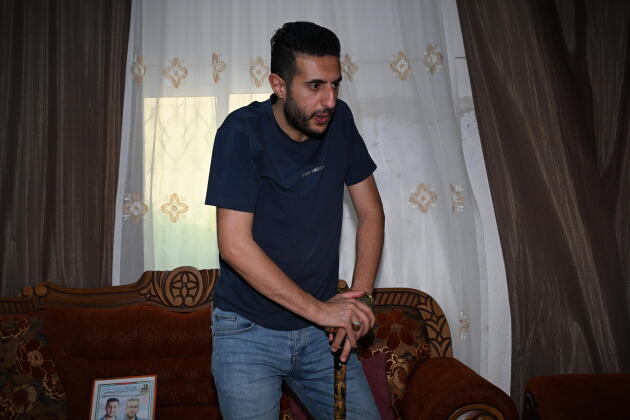Amer Abu Hlel was released from prison on April 15, but in his mind, he’s still rotting away in there. His youthful features contrast with his hunched-over figure, which moves painfully at the entrance of his family home, leaning on an elegantly carved wooden cane. In front of him, a vast terrace overlooks part of the city of Dura, a dense cluster of white dwellings that cover the yellow hills of southern Hebron and the occupied West Bank, wilting under the scorching air of the mid-June afternoon.
Amer has a broken vertebra: A blow in prison aggravated an old spinal fracture. His medical report mentions dilated veins in his testicles. “That’s where it hurts the most. The day I was released, they hit me in the street, in front of people,” grimaced the 30-year-old, his eyes reddened by insomnia. “The physical pains will eventually pass, but those of the soul are indelible.”

Amer had been working for a Palestinian local radio station when he was arrested on December 4, 2022, and placed in administrative detention without any charge or trial. He was released after a year and four months, during which time he had lost several dozen kilos. A video taken by his family at the time of his release shows him looking haggard and disheveled, weeping and walking with difficulty, supported by male relatives. Amer fears that his brother, Amr, 27, a Hamas activist, will die in his cell. He was arrested on December 19, 2023, and is suffering from cancer. In prison, however, “there is no treatment,” said Amer.
He had been active in the Islamic movement at his university, but today asserts that he belongs to “no movement.” At the end of 2022, when he was placed in detention, he chose to be placed with the Hamas prisoners, to whom he felt closer than to those of Fatah, and whose section had the reputation of being better organized, around a pious way of life.
‘Returned from beyond the grave’
Since his release, Amer hasn’t left his house. He hardly sleeps at all and stays prostrate in front of his television, which broadcasts live images of the massacres in Gaza. To those who ask him to tell them about his time in prison, he says he has “returned from beyond the grave.” Fear overwhelmed him and he ended up shutting his family out. “My voice gets carried away quickly, I’m on edge, short-tempered. No one dares to speak at home anymore.” He sent his wife and 9-month-old son, Tawfiq, to stay with his in-laws for 10 days. He couldn’t stand the child’s screams any longer, he admitted, looking away. The baby was born after seven years of marriage, while he was in prison. The young father still can’t bear to hold him in his arms.
You have 77.07% of this article left to read. The rest is for subscribers only.
This post was originally published on this site be sure to check out more of their content.






